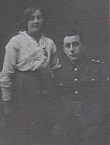jackx
Posts: 353
Joined: 7/8/2009
From: Germany
Status: offline

|
Several good points again - infantry fire surely was important, and enabled British infantry in line to repel French cavalry over a hundred years prior to Waterloo already. Wounded and dying horses seem to have contributed to that at least as much as any fear of death on part of the cavalry.
Again, I blame Waterloo for overdramatized depictions of squares that make them seem so important, when in fact, over a hundred years earlier, infantry already turned back cavalry in line, and nobody made much of a fuss about it, because it was the expected outcome. Ok, maybe the French did, as it lost them the battle of Blenheim, but they're usually quick to point out that they didn't really mean to charge the infantry, but being in pursuit of the Allied horse, ended up too close to it to avoid its fire, became severely disordered and where then routed by the reformed allied cav.
Similarly, when Swedish cavalry at Poltava were ordered to charge the Russian foot after the collapse of their own infantry, from the accounts that survive, they were very aware that this was a desperate measure, and mostly a sacrifice to give the infantry time to escape. I wouldn't accuse these horsemen of a "lack of gusto" in the charge with cold steel (though arguably, that was (re-)introduced as an anticavalry measure, and worked well in that regard), but whether the Russians formed square or remained in line, they turned the charges away with ease.
I don't know how to reconcile earlier accounts of heavy horse quite literally "plowing" through defensive infantry formations (though as you mentioned, with unclear destructiveness) with 18th century accounts of horse (physically) refusing to charge into infantry formations most of the time, and of course we have a third type of heavy horse, the cataphracts of (late) antiquity, which supposedly "ground down" there opponent in prolonged melee...
For the 18th century, it seems to be the threat of cavalry that made it valuable in a combined arms setting on the battlefield (much of the value of cavalry is due to its off-battlefield functions, but that's not part of the game, or this discussion), not so much the actual attack. Infantry had a good chance of withstanding attacking cavalry (without there being widespread agreement on the nature, and causes of this), and inflicting considerable casualties in the process, but it could do very little against cavalry hovering close, but out of effective weapons range.
This also reinforced the role of cavalry as the most effective counter to enemy cavalry, leading to almost separate infantry and cavalry engagements, a trend further reinforced by the lack of institutionalized combined arms.
When cavalry attacks on infantry formations happened, they usually happened in a support role - either reinforcing success, or trying to cover a weakness - Driesen at Leuthen is a good example of the latter, and with a decisive part in the outcome of the battle. (So is Seydlitz at Zorndorf arguably, but that's a less clear-cut case with many more what-ifs.)
What exactly that should mean in gameplay terms I don't know yet, it's probably best to wait and see how it plays out once cav-vs-cav works as intended, but I think that readjustments to the disruption modifiers are necessary, and an increased chance for morale loss also seems a reasonable option.
All this debate about cavalry-vs-infantry also has to be seen in front of the background of the continuing shift of tactical advantage from the attacker to the defender, and the ever-increasing dominance of field artillery. This shaped the course of battles, and thus the opportunities for successful employment of cavalry, considerably. The support and "mobile reserve" roles of the cavalry were strengthened, its value as a direct, offensive weapon decreased.
(All these are generalised interpretations of trends, of course, so it shouldn't be hard to find at least one example of the exact opposite for all of the above... ;))
Edit: Expanded the post as I had to rush off earlier, hopefully my attempt at a summary can also serve as a basis for compromise.
< Message edited by jackx -- 7/21/2009 11:50:03 AM >
_____________________________
no truth - no justice
all false belief
blinded by morality
there shall be ... no peace
|
 Printable Version
Printable Version












 New Messages
New Messages No New Messages
No New Messages Hot Topic w/ New Messages
Hot Topic w/ New Messages Hot Topic w/o New Messages
Hot Topic w/o New Messages Locked w/ New Messages
Locked w/ New Messages Locked w/o New Messages
Locked w/o New Messages Post New Thread
Post New Thread